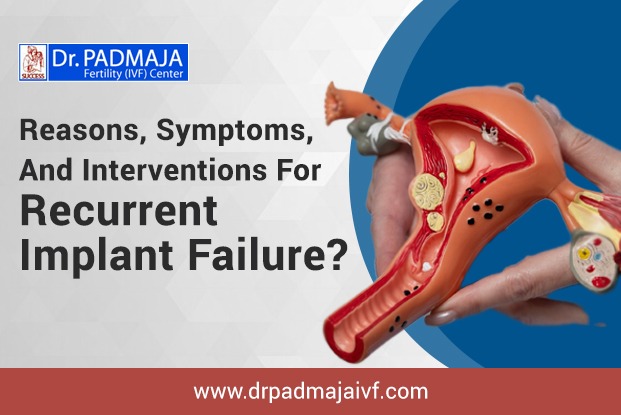One of the most challenging and emotionally draining experiences for couples undergoing fertility treatment is recurrent implantation failure (RIF). After investing time, money, and hope into IVF or IUI cycles, hearing that the embryo has failed to implant again can be devastating. But understanding the reasons, identifying the symptoms, and exploring advanced interventions can offer new hope for couples on their fertility journey.
At the best fertility centre in Hyderabad, like Dr Padmaja IVF Center, specialists work closely with patients to evaluate every factor involved in implantation and tailor personalized strategies that increase the chances of a successful pregnancy.
What is Recurrent Implantation Failure?
Recurrent implantation failure is commonly defined as the failure to achieve a clinical pregnancy after two or more high-quality embryo transfers, typically during IVF treatment. It’s important to note that this doesn’t mean the embryo was unhealthy—it may have reached the uterus but was unable to attach to the uterine lining.
The issue is frustrating because the embryo transfer appears successful, but implantation does not happen. If you’re facing this issue, you’re not alone. Clinics like DrPadmaja Fertility Center see many hopeful parents struggling with RIF and have developed effective solutions to overcome it.
Common Reasons Behind Recurrent Implantation Failure
The first step in resolving the issue is identifying the underlying reasons. Here are the most common reasons:
1. Uterine Factors
Implantation can be hampered by uterine polyps, fibroids, or scar tissue.
A thin or poorly responsive endometrium can also affect the embryo’s ability to attach.
2. Embryo Quality
Even embryos that look healthy may have genetic abnormalities. These issues often go undetected without advanced screening.
3. Immunological Issues
The embryo may occasionally be rejected by the immune system because it perceives it as a foreign entity.
4. Thrombophilia (Blood Clotting Disorders)
Poor blood flow to the uterus due to clotting disorders can hinder implantation.
5. Hormonal Imbalances
Unbalanced levels of estrogen and progesterone can negatively impact the implantation window.
6. Lifestyle Factors
Smoking, obesity, excessive caffeine or alcohol, and stress can all impact fertility outcomes.
At DrPadmaja infertility doctors, thorough investigations are done to uncover even the smallest issues contributing to RIF. Their detailed diagnostic processes set them apart from many infertility centres in Hyderabad.
Symptoms to Watch For
Unlike many other health conditions, recurrent implantation failure doesn’t have clear, physical symptoms. However, if you’ve had two or more failed embryo transfers despite good-quality embryos, that in itself is a symptom and a reason to consult experienced infertility doctors in Hyderabad.
Other indirect signs could include:
Irregular menstrual cycles
Abnormal uterine bleeding
Severe cramping during IVF cycles
If you’ve undergone multiple IVF attempts and still haven’t conceived, it’s time to speak with a specialist at one of the top fertility treatment centers in Hyderabad, such as Dr Padmaja IVF Center.
Interventions and Advanced Treatments
Thankfully, there are multiple interventions to address RIF. Clinics like DrPadmaja Fertility Center employ a holistic and customized approach. Here are some common strategies:
1. Endometrial Receptivity Testing (ERA)
This test determines the best time for embryo transfer by evaluating the endometrium’s readiness.
2. Preimplantation Genetic Testing (PGT)
PGT helps detect chromosomal abnormalities in embryos, ensuring only genetically healthy embryos are transferred.
3. Immunotherapy
In some cases, treatment with corticosteroids, intralipids, or IVIG is recommended to suppress immune rejection of the embryo.
4. Hysteroscopy
This minimally invasive procedure allows doctors to directly examine and treat abnormalities in the uterine cavity.
5. Lifestyle Modifications
Weight management, quitting smoking, stress reduction, and adopting a fertility-friendly diet can significantly boost success rates.
6. IUI or IVF Switching
Some patients may benefit from switching between IUI centres in Hyderabad and full IVF treatment in Hyderabad depending on age, fertility levels, and reproductive history.
Why Choose Dr Padmaja IVF Center?
When you’re dealing with something as delicate and complex as recurrent implantation failure, choosing the right clinic can make all the difference. Here’s why Dr Padmaja IVF Center is often recommended as the best IVF center in Hyderabad:
Expertise: With a team of skilled doctors and embryologists, they offer personalized care and evidence-based treatments.
Advanced Technology: Equipped with the latest diagnostic and therapeutic tools, including ERA, PGT, and hysteroscopy.
Affordable IVF Cost: Compared to many metropolitan cities, IVF cost at DrPadmaja Fertility Center remains reasonable without compromising quality.
Emotional Support: Infertility is not just a medical issue—it’s an emotional journey. The compassionate team offers constant support throughout the process.
Whether you’re just beginning your journey or looking for a second opinion after multiple failed attempts, this center stands among the top-rated IVF centres and infertility centres in Hyderabad for a reason.
Final Thoughts
Recurrent implantation failure is disheartening, but it’s not the end of the road. With the right investigation, tailored treatments, and support from experienced specialists, you can still achieve your dream of parenthood.
Don’t lose hope. Talk to expert infertility doctors in Hyderabad and explore the best available options. Clinics like Dr Padmaja IVF Center offer world-class solutions and compassionate care, helping thousands of couples turn their dream into reality.
Whether it’s your first IVF attempt or your fifth, remember—every journey is unique, and the right guidance can make all the difference.
About the Author

This blog is penned by a devoted content specialist passionate about raising awareness around fertility treatments and emotional well- being. With in- depth disquisition on motifs like IVF and fertility, the thing is to give precious perceptivity for couples on their trip to parenthood.
Frequently Asked Questions (FAQs)
- What is Recurrent Implantation Failure (RIF)?
Recurrent Implantation Failure refers to the inability of an embryo to successfully implant in the uterine lining after multiple IVF or ICSI cycles, despite transferring good-quality embryos. Typically, RIF is considered after three or more failed embryo transfers.
- Can poor egg or sperm quality lead to implantation failure?
Yes. Poor-quality eggs or sperm can lead to chromosomally abnormal embryos, which are less likely to implant or result in a successful pregnancy.
- Does stress or lifestyle affect implantation success?
Yes. Chronic stress, smoking, obesity, and poor nutrition can negatively impact fertility and implantation. Adopting a healthy lifestyle can enhance treatment outcomes.
- Can recurrent implantation failure be prevented?
While not always preventable, early diagnosis, customized treatment plans, and addressing underlying conditions can significantly improve the chances of successful implantation.
- What are the common causes of recurrent implantation failure?
Several factors can contribute to RIF, including:
Poor embryo quality
Uterine abnormalities (e.g., fibroids, polyps, adhesions)
Endometrial receptivity issues
Immunological or autoimmune problems
Genetic abnormalities in embryos
Hormonal imbalances or blood clotting disorders
- What are the symptoms of implantation failure?
Implantation failure often has no specific symptoms. However, in IVF cycles, failure is typically identified when:
Pregnancy tests remain negative after embryo transfer
Menstrual cycle resumes as normal
In some cases, spotting or mild cramps may be noted
- How is recurrent implantation failure diagnosed?
Doctors usually diagnose RIF after multiple failed embryo transfers with high-quality embryos. Diagnostic tests may include:
Hysteroscopy or 3D ultrasound to assess the uterus
Endometrial biopsy
Genetic screening (PGT)
Thrombophilia and immunological panels
ERA (Endometrial Receptivity Analysis)

